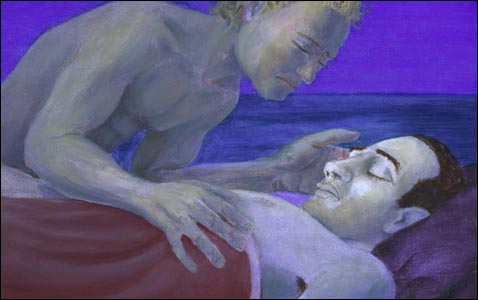|
|

|
|
|

|
|
|

|
|
|
|
Book Nineteen
|
|
|
|
Achilles (a-KIL-eez) doesn't want to bury Patroclus (pa-TRAH-klus) until he has avenged his death, but he is concerned that worms and blowflies will infest the wounds and the corpse will rot. Thetis (THEH-tis) tells him not to worry and preserves the body with heavenly ambrosia and nectar. And now Achilles calls a great assembly of all the Greeks and publicly declares that his anger is forgotten, his quarrel with Agamemnon (a-guh-MEM-non) over and done with. The Greeks shout out as one with joy and relief.
|
|
|
|
Agamemnon rises to his feet to say that he was in the wrong but there was nothing he could do since he was maddened by Ruin. Why, Ruin had even blinded Zeus (zyoos) himself when Alcmena (alk-MEE-nuh) was about to give birth to his son Heracles (HER-uh-kleez) and he declared that the child about to be born would be a great ruler. Hera (HEER-uh) had tricked him into swearing that the next child born in Thebes (theebz) would become king, and then she had held back the birth pangs of Alcmena while causing Heracles' cousin Eurystheus (yoo-RIS-thyoos) to be born two months prematurely. Enraged but powerless to revoke his oath, Zeus had cast Ruin out from Olympus, to be ever afterwards an affliction for mortals alone. But the damage had been done, and Zeus could not but look on in frustration as Eurystheus ordered Heracles to perform his arduous Labors.
|
|
|
|
And so Agamemnon had been powerless against the madness brought on by Ruin, but now he would eagerly make amends. He offers the entire ransom that Odysseus (oh-DISS-yoos) had detailed to Achilles previously. But Achilles does not want to hear about ransom. He wants only to lead all the Greeks into battle right now.
|
|
|
|
"Not on an empty stomach," insists Odysseus. He proposes that the ransom be brought forth for all the troops to admire and then Agamemnon seal the peace by preparing a sumptuous feast. Agamemnon readily concurs and orders his herald to bring a wild boar to be sacrificed to the Sun and to Zeus. Achilles resists, insisting that it is proper to mourn his dead companion by fasting, to which Odysseus replies that if they had so honored all the fallen in this conflict there never would have been an end of fasting.
|
|
|
|
Agamemnon dispatches him to bring the ransom, and he returns to lay it all out before the assembly. He brings Briseis (bry-SEE-us) as well, the young woman whom Agamemnon had taken from Achilles and whom Achilles had held dear. Cutting some hairs from the boar's head to begin the ritual, Agamemnon swears an oath that he has never slept with Briseis. He calls on Zeus and the Furies — avengers of broken vows — to be his witnesses. So saying he slits the boar's throat, and his herald swings it around his head and heaves it out to sea to be devoured by fishes.
|
|
|
|
The assembly is dismissed to feast before the battle. Briseis is returned to Achilles' tent. She breaks down in sobs at the sight of Patroclus. On the day when her husband and three brothers had been slain, Patroclus had consoled her with the promise that she would become Achilles' lawful wife. She weeps at the memory of his kindness. Achilles too is inconsolable as he embraces the dead form of his comrade. It had always been his hope that once he himself had died as fated in Troy, Patroclus would retrieve Neoptolemus (nee-op-TOL-eh-mus), Achilles' son, from Scyros (SKY-ros) where he was being raised and sail with him to Phthia (FTHY-uh), there to show him Achilles' palace and his wealth. He renews his vow not to touch food until Patroclus has been avenged. Hearing this, Zeus is moved to pity and sends Athena (a-THEE-nuh) to infuse Achilles with nectar and ambrosia to ward off hunger.
|
|
|
|
As Achilles arms for battle he grinds his teeth in rage. He fastens the silver clasps of his shinguards, straps on his burnished breastplate, slings his sword over his shoulder, and dons his helmet with its imposing horsehair plume. He takes up the shield that shines as bright as a watchfire blazing up on a mountainside to signal sailors blown off course at sea. He spins around to test the fit of his armor and finds it worthy of the divine craftsman who fashioned it. And finally he hefts the spear which the centaur Chiron (KY-ron) had given his father, a weapon that only Achilles can wield.
|
|
|
|
Mounting his chariot, he commands his divine stallions to do better this time, to bring their master home from the battle alive. Given tongue by Hera (HEER-uh), one of the horses responds in a human voice. "It was Apollo killed Patroclus, master, not any fault of our own. You too are fated to die soon enough, although we'll bring you back safely this time." Achilles responds in anger that he is well aware of his impending doom.
|
|
|
|
|
|
|
|
|
|
|
|
|
|
|

|
|
|

|



